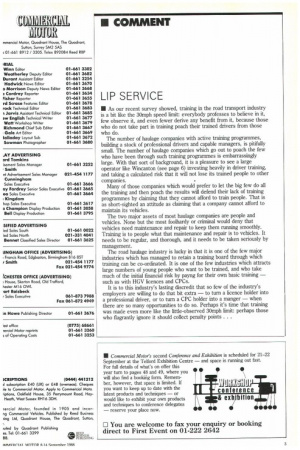LIP SERVICE
Page 3

If you've noticed an error in this article please click here to report it so we can fix it.
• As our recent survey showed, training in the road transport industry is a bit like the 30mph speed limit: everybody professes to believe in it, few observe it, and even fewer derive any benefit from it, because those who do not take part in training poach their trained drivers from those who do.
The number of haulage companies with active training programmes, building a stock of professional drivers and capable managers, is pitifully small. The number of haulage companies which go out to poach the few who have been through such training programmes is embarrassingly large. With that sort of background, it is a pleasure to see a large operator like Wincanton (see page 6) investing heavily in driver training, and taking a calculated risk that it will not lose its trained people to other companies.
Many of those companies which would prefer to let the big few do all the training and then poach the results will defend their lack of training programmes by claiming that they cannot afford to train people. That is as short-sighted an attitude as claiming that a company cannot afford to maintain its vehicles.
The two major assets of most haulage companies are people and vehicles. None but the most foolhardy or criminal would deny that vehicles need maintenance and repair to keep them running smoothly. Training is to people what that maintenance and repair is to vehicles. It needs to be regular, and thorough, and it needs to be taken seriously by management.
The road haulage industry is lucky in that it is one of the few major industries which has managed to retain a training board through which training can be co-ordinated. It is one of the few industries which attracts large numbers of young people who want to be trained, and who take much of the initial financial risk by payng for their own basic training — such as with HGV licences and CPCs.
It is to this industry's lasting discredit that so few of the industry's employers are willing to do that bit extra — to turn a licence holder into a professional driver, or to turn a CPC holder into a manger — when there are so many opportunities to do so. Perhaps it's time that training was made even more like the little-observed 30mph limit: perhaps those who flagrantly ignore it should collect penalty points . . .














































